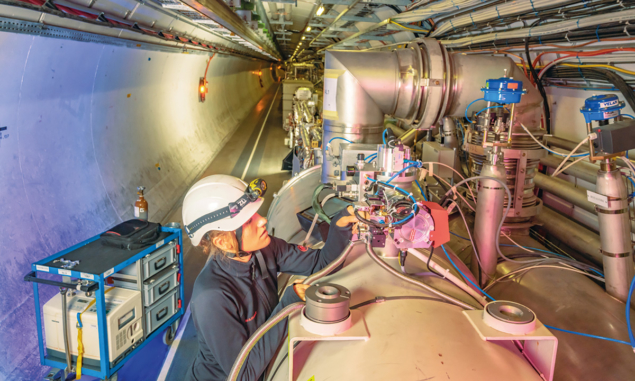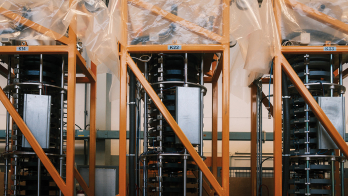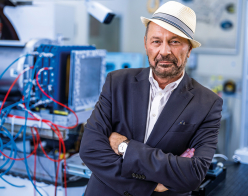While CERN holds a natural attraction for physicists, hiring the engineers, technicians and others who build, operate and maintain the lab’s complex infrastructure is more challenging, explains Anna Cook.

CERN enjoys a world-class reputation as a scientific laboratory, with the start-up of the Large Hadron Collider and the discovery of the Higgs boson propelling the organisation into the public spotlight. Less tangible and understood by the public, however, is that to achieve this level of success in cutting-edge research, you need the infrastructure and tools to perform it. CERN is an incredible hub for engineering and technology – hosting a vast complex of accelerators, detectors, experiments and computing infrastructure. Thus, CERN needs to attract candidates from across a wide spectrum of engineering and technical disciplines to fulfil its objectives.
CERN employs around 2600 staff members who design, build, operate, maintain and support an infrastructure used by a much larger worldwide community of physicists. Of these, only 3% are research physicists. The core hiring needs are for engineers, technicians and support staff in a wide variety of domains: mechanical, electrical, engineering, vacuum, cryogenics, civil engineering, radiation protection, radiofrequency, computing, software, hardware, data acquisition, materials science, health and safety… the list goes on. Furthermore, there are also competences needed in human resources, legal matters, communications, knowledge transfer, finance, firefighters, medical professionals and other support functions.
On the radar
CERN’s hiring challenge takes on even greater meaning when one considers the drive to attract students, graduates and professionals from across CERN’s 32 Member and Associate Member States. In what is already a competitive market, attracting people from a large multitude of disciplines to an organisation whose reputation revolves around particle physics can be a challenge. So how is this challenge tackled? CERN now has a well-established “employer brand”, developed in 2010 to promote its opportunities in an increasingly digitalised environment. The brand centres around factors that make working at CERN the rich experience that it is, namely challenge, purpose, imagination, collaboration, integrity and quality of life – underpinned by the slogan “Take part”. This serves as an identity to devise attractive campaigns through web content, video, online, social media and job-portal advertisements to promote CERN as an employer of choice to the audiences we seek to reach: from students to professionals, apprenticeships to PhDs, across all diversity dimensions. The intention is to put CERN “on the radar” of people who wouldn’t normally identify CERN as a possibility in their chosen career path.
CERN doesn’t just bring together people from a large scope of fields but unites people from all over the world
As no single channel exists that will allow targeting of, for example, a mechanical technician in all CERN Member States, creative and innovative approaches have to be utilised. The varying landscapes, cultural preferences and languages come into play, and this is compounded by the different job-seeking behaviours of students, graduates and experienced professionals through a constantly evolving ecosystem of channels and solutions. A widespread presence is key. The cornerstones are: an attractive careers website; professional networks such as LinkedIn to promote CERN’s employment opportunities and proactively search for candidates; social media to increase visibility of hiring campaigns; and being present on various job portals, for example in the oil, gas and energy arenas. Outreach events, presence at university career fairs and online webinars further serve to present CERN and its diverse opportunities to the targeted audiences.
Storytelling is an essential ingredient in promoting our opportunities, as are the experiences of those already working at CERN. In the words of Håvard, an electromechanical technician from Norway: “I get to challenge myself in areas and with technology you don’t see any other place in the world.” Gunnar, a firefighter from Germany describes, “I am working as a firefighter in one of the most international fire brigades at CERN in what is a very complex, challenging and interesting environment.” Katarina, a computing engineer from Sweden, says, “The diversity of skills needed at CERN is so much larger than what most people know!” While Julia, a former mechanical engineering technical student from the UK put it simply: “I never knew that CERN recruited students for internships.” Natasha, a former software engineering fellow from Pakistan, summed it up with, “Here I am, living my dreams, being a part of an organisation that’s helping me grow every single day.” Each individual experience is a rich insight for potential candidates to identify with and recognise the possibility of joining CERN in their own right.
CERN doesn’t just bring together people from a large scope of fields but unites people from all over the world. Working as summer, technical or doctoral student, as a graduate or professional, builds skills and knowledge that are highly transferable in today’s demanding and competitive job market, along with lasting connections. As the cherry on the cake, a job at CERN paves the way to become CERN’s future alumni and join the ever-growing High-Energy Network. Take part!







